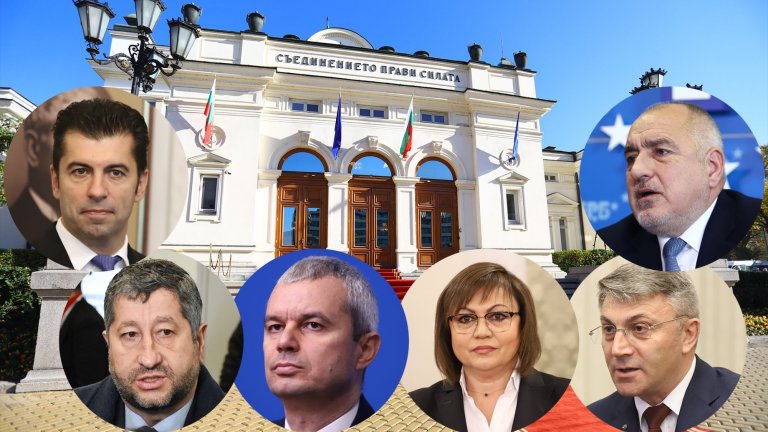By Teodora Yovcheva (University of Sofia)
On 2 April, Bulgaria held its fifth elections for two years. They were the result of the inability of the parties to form a government after the early parliamentary election in October 2022. The winner of them was unclear during most of the time, changing between the electoral alliances of GERB-SDS and “We continue the change-Democratic Bulgaria” (PP-DB) until the next day when GERB-SDS came on top with narrow margin. The prospects of government formation however remain uncertain having the difficulties of the parties to cooperate in last two years.
How did we get there?
The election cycle started two year earlier, in April 2021 when the regular parliamentary election was held. It was won by the then ruling GERB in alliance with SDS. However, GERB-SDS did not won absolute majority and partners were needed. Having the polarization in the country, partners were not found as most of the parties declare that they will not cooperate with GERB during the campaign. No one dare to propose a cabinet also. As a result early elections were scheduled for July 2021. These were won by the populist formation “There is such a people”(ITN), created by the popular TV host and singer Slavi Trifonov. Winged by the victory, ITN preferred not to form coalition with the other parties. This is how third election in November 2021 was held. Again, completely new formation – “We continue the change”, established by the popular care-taker ministers Kiril Petkov (economics) and Asen Vasilev (finance), won. They managed to form a government, but the coalition, which brought together PP, the Bulgarian Socialist Party, the populist ITN and the alliance called Democratic Bulgaria, was so ideologically heterogeneous that collapsed in the first successful vote of no confidence since the democratic transition, less than eight months later. Then, again, new election was scheduled for October 2022. The winner was again GERB-SDS, but due to the polarization among parties and electorates, and also fragmentation, a government was not formed. The result was fifth (fourth early) parliamentary election in two years.
Who is actually the winner?
Although GERB-SDS won the elections, the formation of a government would not be an easy task. The polarization is still high. One of the most likely scenario is technocratic government. However, the support for such cabinet is questionable not only because of the polarization, but also because local elections are coming in November and the parties may be reluctant to step in unpopular cooperation.
It seems that one of the winners of the election cycle is the far right and pro-Russian party Revival. Based its campaign against the adoption of the euro and inflation rate, the party has its electoral record winning the third position and more than 14% of the vote. It barely managed to pass the threshold in November 2021 mainly after its consistent stance against the covid-19 restrictions. Since then Revival tripled its result surpassing the usual third “Movement for Freedom and rights”. The party has adopted Eurosceptic rhetoric which blocks the cooperation with other formations. Nevertheless, it is the party which clearly managed to increase its support during the election cycle.
A surprise of the election, and in some sense, winner is also the populist party “There is such a people” (ITN) which managed to return to the parliament. Through its short history ITN managed to win elections in 2021 and after one year to be unable to pass the threshold. By refusing to cooperate with the other parties and form a coalition in July 2021, ITN triggered early parliamentary election which happened to be less successful for the party. ITN’s result decreased and they joined he government led by the winner “We continue the change” and prime minister Kiril Petkov, but after series of disagreements around ITN withdraw its support. The opposition took advantage and Petkov’s government became the first one since the democratic transition overthrown by a vote of non-confidence. ITN did not manage to pass the threshold on the following early parliamentary election in October 2022. Recently however the party started to advocate for the constitutional reform in Bulgaria – replacing the parliamentary republic with a presidential one. Having this claim and the history of destructive parliamentary behaviour, consistent constructive role is hardly to be expected.
What are the consequences of the elections cycle?
The turnout of the yesterday’s election was around 41% – a percent higher that the record low in Bulgaria (October 2022). The tendency of low turnout is detected from the beginning of the election cycle, but the drop is more evident at the first early election in July 2021. Citizens abstain from political participation discouraged by the uncertain perspectives of government formation. This questions not only the chances for forming a government, but also the legitimacy of the whole system.
At the same time, Bulgaria still does not have a budget. Having the difficult economic situation and high inflation rates, the parties will need to make a “gentlemen deal” at least to work on this. This however hides a risk, because if the parties are headed to new elections, the budget could be used as a source for generous campaign promises. If the spiral of elections continues, Bulgarian policy would be transferred in the hands of the president Rumen Radev who appoints caretaker cabinets, often acting against the consensus among political parties. The inability of the parties to form a government in practice is a potential source for feeding a leanings against parliamentary democracy and in favour of strongman rule.
Photo source: https://webcafe.bg/politika/izbori-2023-pri-100-obraboteni-protokoli-gerb-pecheli-s-malko-pod-2-protsenta.html?fbclid=IwAR3gmgG5vQd3D1iPl9ZZ9-TCIO2jMl2hwzTyvpOVjafwJ7rLbjRYPVz67Rs


